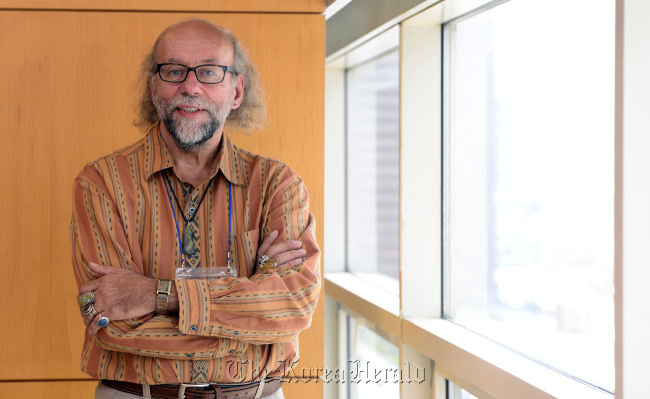U.S. publisher interested in Korea’s young writers, translators
By Claire LeePublished : June 24, 2012 - 20:13
Dennis Maloney of White Pine Press speaks on Korean literature, advises on ways to promote it better
It’s been 19 years since American publisher White Pine Press released its first book of Korean literature, “The Snowy Road and Other Stories,” in 1993.
After publishing 16 books of Korean lit, mostly collections of poems, White Pine Press’ founding editor and poet Dennis Maloney says he is now interested in writers and translators from Korea’s younger generation.
“We have done several books of Korean fiction over the years, but they were mainly stories dealing with the post-war period in Korea,” Maloney told The Korea Herald in Seoul on Thursday. He arrived here last week to participate as one of the speakers for an international workshop on Korean literature organized by Korea Literature Translation Institute.
“And those stories have obviously very specific historical and cultural context. And having done three volumes of books like that, I felt that was sufficient because the (contemporary) American audience is, I think, perhaps less interested in such subject matter.
“So I am in talks with KLTI to put an anthology together of younger Korean writers who would be dealing with the themes that are more current. We may do some individual collections after that.”
It’s been 19 years since American publisher White Pine Press released its first book of Korean literature, “The Snowy Road and Other Stories,” in 1993.
After publishing 16 books of Korean lit, mostly collections of poems, White Pine Press’ founding editor and poet Dennis Maloney says he is now interested in writers and translators from Korea’s younger generation.
“We have done several books of Korean fiction over the years, but they were mainly stories dealing with the post-war period in Korea,” Maloney told The Korea Herald in Seoul on Thursday. He arrived here last week to participate as one of the speakers for an international workshop on Korean literature organized by Korea Literature Translation Institute.
“And those stories have obviously very specific historical and cultural context. And having done three volumes of books like that, I felt that was sufficient because the (contemporary) American audience is, I think, perhaps less interested in such subject matter.
“So I am in talks with KLTI to put an anthology together of younger Korean writers who would be dealing with the themes that are more current. We may do some individual collections after that.”

Maloney, who majored in landscape architecture, started writing and translating poems while attending college. He spent his last semester in Kyoto, Japan, doing a special project on Japanese gardens. Inspired by his experience there, he co-translated a number of Japanese as well as Spanish collections of poems into English.
He worked on making the first drafts ― created by his co-translators who are fluent in Japanese or Spanish ― sound more coherent in the form of English language.
Maloney said while such co-translation, which is being adopted by many translators today, makes “a lot of sense,” he is also beginning to see translators who are fully bilingual and capable of doing both literal and nuanced translations without a partner.
“We are now seeing Korean studies programs at Harvard and University of British Columbia in Canada, where Korean studies specialists David McCann and Bruce Fulton are teaching,” he said.
“The quality of what they translate is very good and now they have their graduate students. And they are pleased with their students’ translating. I think we are now starting to see a newer, younger generation of translators who can navigate both Korean and English languages.”
Throughout the years, White Pine Press has published 12 collections of Korean poems, by poets including Ko Un, Hwang Ji-woo, and Kim Ji-ha. To introduce and market Korean poetry to the American audience better, White Pine Press tried to look for points of entry with which the readers in the U.S. were already familiar and used them as publicity materials.
“Ko Un’s (Buddhist) works, for example, resonate very well with the ones of American poet Gary Snyder,” he said.
“And I think Moon Chung-hee has a certain feminist outlook that fits in well with a number of women poets in the U.S. And readers who are used to a certain type of American writer would easily engage with Korean poets whose works are similar to the American ones.”
The sensational success of Korean writer Shin Kyung-sook’s “Please Look After Mom” in the U.S. can be interpreted in a similar way, he said, as many American readers were familiar with books by Asian-American female writers ― including Amy Chua’s controversial Asian-parenting memoir “Battle Hymn of the Tiger Mother,” Amy Tan’s “The Joy Luck Club,” and “The Woman Warrior” by Maxine Hong Kingston.
Maloney also said a lot of get-togethers of American and Korean writers would also help promote Korean literature overseas, as more foreign readers would be interested when recognized writers in their countries write reviews on Korean works of fiction and poetry.
The KLTI’s 11th International Workshop for Translation and Publication of Korean literature was held at COEX Conference Center in southern Seoul on June 21.
Participants included Michelle Nam, the executive director of local publishing house Minumsa, Jeremy M. Davis, senior editor of Dalkey Archive Press, and Marysia Juszczakiewicz, founding agent of Peony Literary Agency.
By Claire Lee (dyc@heraldcorp.com)




![[Herald Interview] 'Amid aging population, Korea to invite more young professionals from overseas'](http://res.heraldm.com/phpwas/restmb_idxmake.php?idx=644&simg=/content/image/2024/04/24/20240424050844_0.jpg&u=20240424200058)











![[KH Explains] Korean shipbuilding stocks rally: Real growth or bubble?](http://res.heraldm.com/phpwas/restmb_idxmake.php?idx=652&simg=/content/image/2024/04/25/20240425050656_0.jpg&u=)

